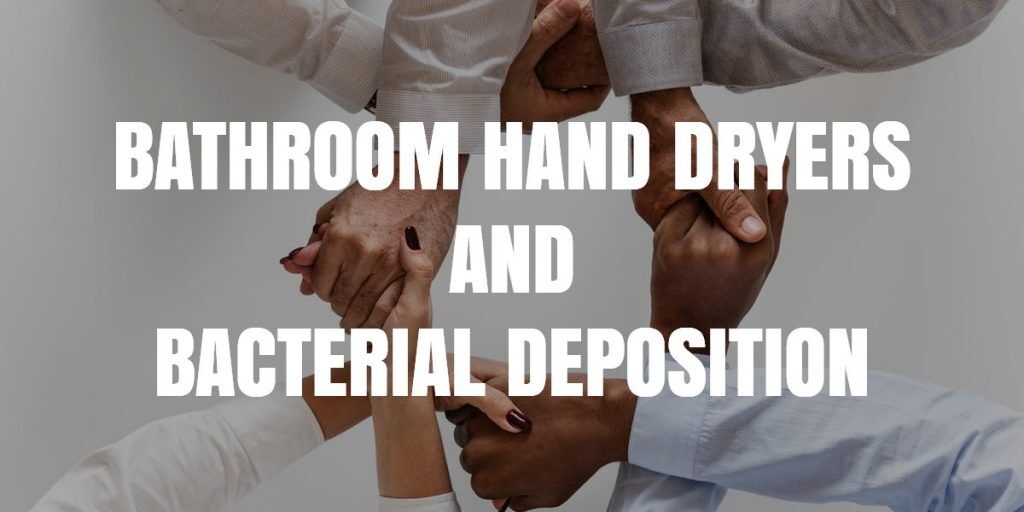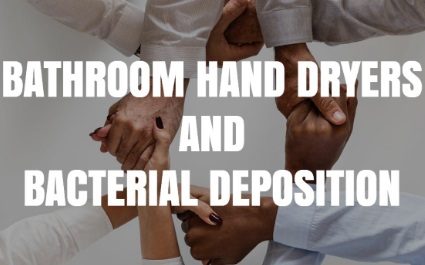Outsourcing your businesses' janitorial services will cost-effectively reduce the spread of bacteria and bacterial spores deposited by air-blown hand dryers in bathrooms.

Restroom Hand Dryers Spray Feces All Over Your Hands
Air-blown hand dryers were manufactured and distributed with the intent of reducing the environmental impact of paper towel use, eliminating issues with paper towel availability, and improving hand sanitation.
In theory, this sounds like a great idea.
However, in practice, the hand dryers suck in air contaminated with germs, bacteria, and fecal matter, then spray them all over your freshly washed hands--typically leaving them far filthier than before they were washed.
The air quality inside a restroom is the result of several factors, including:
- Foot traffic.
- Lidless toilets, and;
- How often the toilets are disinfected.
Studies have shown that toilets can retain matter from previous use through several flushings and can expel a plume of bacteria-laden particles up to 15 feet in the air--particularly in public restrooms with lidless seats.
Bacteria in bathrooms will come from feces, which can be aerosolized a bit when toilets, especially lidless toilets, are flushed.
The simple movement of lots of people in and out of the bathroom, shedding microbes from their skin [...] adds to the messy picture.
Hand dryers suck up bathroom air and spew it out at speed.
So, in the brief moments your hands rest below the nozzle, they’ll be exposed to far more air than usual—and far more bacteria.
Restroom Hand Dryers Suck Up Feces Particles and Spray Them All Over Your Hands
Additionally, research has shown that the air in the immediate vicinity of the dryer is significantly more contaminated than the air immediately surrounding the paper towel dispensers.
According to a recent study;
Bacteria levels in the air around jet-air dyers were four and a half times higher compared with warm-air dryers and 27 times higher compared with the air around paper towel dispensers.
The bacteria persisted in the air around hand dryers long after they were used, reported the scientists.
Bacteria could still be detected 15 minutes after use.
Paper Towels vs. Hand Dryers
Despite an increasing consumer preference for paper towel use in public restrooms, hand dryers remain a mainstay in facilities throughout the United States.
This is due, in part, to operational and manufacturing costs.
According to a recent article by RestroomDirect;
There is no question that hand dryers are much less expensive to operate than paper towels.
A hand dryer costs between .02 cents and .18 cents in electricity per dry vs a paper towel that typically costs about 1 cent per sheet (that equates to $20 in hand dryer costs vs $250 in paper towel costs if the average use is 2.5 sheets per dry.)
In fact, it takes more energy just to manufacture even a recycled paper towel than it does to operate a hand dryer.
Which is better in a commercial restroom? Hand dryers or paper towels?
However, according to an accumulation of studies compiled by the Mayo Clinic, paper towels are the superior option when considering the discussion from the perspective of hand-hygiene.
Hand hygiene has the potential to prevent diseases and reduce health care–associated infections.
The proper drying of hands after washing should be an essential component of effective hand hygiene procedures.
Most studies have found that paper towels can dry hands efficiently, remove bacteria effectively, and cause less contamination of the washroom environment.
From a hygiene standpoint, paper towels are superior to air dryers; therefore, paper towels should be recommended for use in locations in which hygiene is paramount, such as hospitals and clinics.
The provision of paper towels should also be considered as a means of improving hand hygiene adherence among health care workers.
The Hygienic Efficacy of Different Hand-Drying Methods: A Review of the Evidence
Health and Safety Tips for Cleaning and Use
The best advice is to avoid the use of air or jet-blown hand dryers altogether.
Where that is not possible, we recommend the following for occupants:
- Put the toilet seat, if one is available, down before flushing the toilet, and;
- Use liquid hand sanitizer after exiting the restroom.
For businesses:
- Install seats on all toilets.
- Clean and disinfect toilets on a schedule in line with use.
- Use an EPA Category IV disinfectant with residual efficacy to disinfect all surfaces, including the inside of the toilet and all over the hand dryer.
- Ensure proper ventilation in the restroom and consider installing HEPA filters in the air vents or as stand-alone systems.
- Additionally, consider installing hand dryers with HEPA filtration systems to reduce the spread of germs.
- Install IoT monitors for paper towels to gauge occupancy and use as well as paper resource availability and schedule on-demand cleaning services as needed.
- Make liquid hand sanitizer available for occupants when exiting the facility.
References & Resources
- The Great Bathroom Debate: Paper Towel or Hand Dryer?
- Deposition of Bacteria and Bacterial Spores by Bathroom Hot Air Hand Dryers
- Hand dryers can spread bacteria in public toilets, research finds
- Restroom Hand Dryers Are Blowing Bacteria Everywhere
- Here's The Gross Truth About Bathroom Hand Dryers
Takeaway
Studies increasingly show that jet and air-blown hand dryers, even filtered, are not suitable for public use, especially in a healthcare environment.
Jet air and warm air dryers result in increased bacterial aerosolization when drying hands.
These results suggest that air dryers may be unsuitable for use in healthcare settings, as they may facilitate microbial cross-contamination via airborne dissemination to the environment or bathroom visitors.
For organizations who currently employ the systems, improved cleaning and disinfection practices can significantly reduce the likelihood of the hand dryers spreading dangerous pathogens to building occupants.
If you would like to learn more about the health issues associated with air-blown hand dryers or the advantages of outsourcing your school or business's janitorial needs–contact us today for a free quote!
In Bakersfield CA, call (661) 4373253
In Fresno CA, call (559) 206-1059
In Valencia CA, or Santa Clarita CA, call (661) 437-3253

